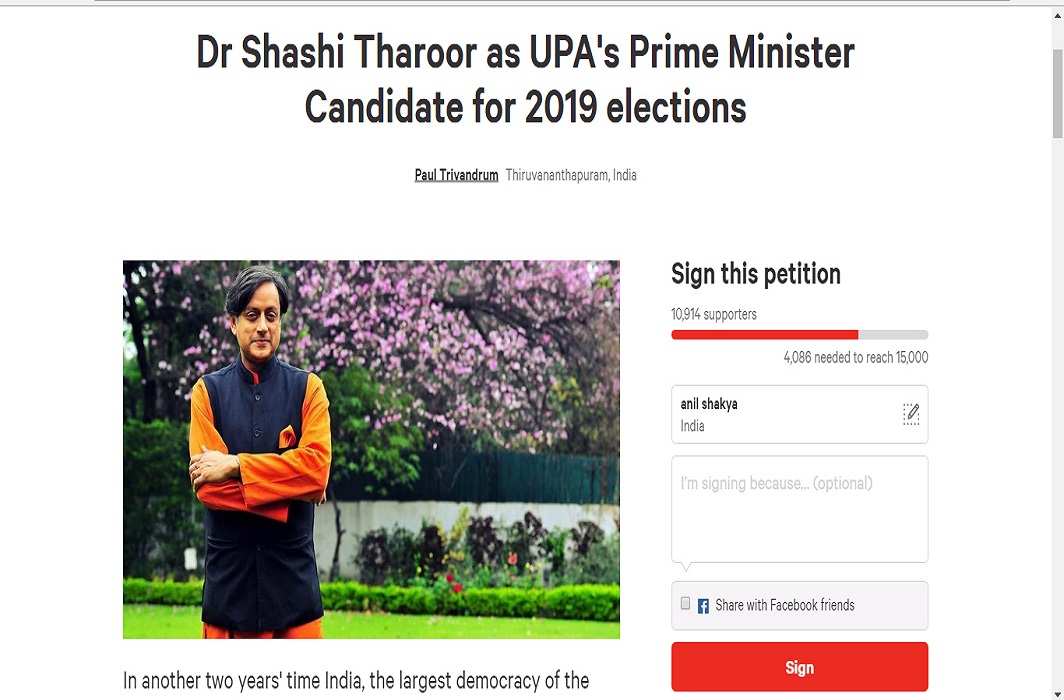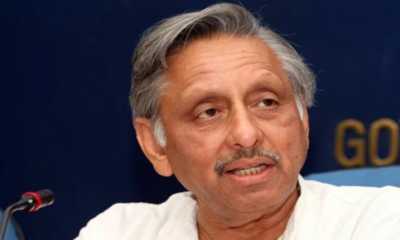[vc_row][vc_column][vc_column_text]An online petition on these lines might have set the cat among the Congress coterie mice
~By Meha Mathur[/vc_column_text][vc_column_text]The election results for the Uttar Pradesh and Uttarakhand assemblies have cemented Prime Minister Narendra Modi’s stature as the tallest national leader and at the same time eclipsed all other leaders.
None can come close to him in mass following, even opposition leaders concede. So much so that National Conference leader Omar Abdullah tweeted: “In a nutshell there is no leader today with a pan-India acceptability who can take on Modi and the BJP in 2019. At this rate we might as well forget 2019 and start planning/hoping for 2024,”
And Congress stalwart P Chidambaram admitted: “The elections today have clearly established that the most dominant political figure in India is Prime Minister Modi. And he has a pan-India appeal.” For this, he has been rebuked by the top Congress leadership.
Now that Rahul Gandhi has clearly failed to garner votes for his party – the victory in Punjab was more a result of the personal charisma of Captain Amarinder Singh, and had little to do with the Nehru-Gandhi family — the desperation to find a viable competitor to Modi is gaining ground. And a petition on Change.org—an online petition portal, mobilising opinion globally on social, developmental and political issues—is a step in that direction. With more than 10,000 signatures already, this petition wants Congress MP from Thiruvananthapuram, Shashi Tharoor, to be Congress’ prime ministerial face for the 2019 elections.
The petition, addressed to President Indian National Congress, All India Congress Committee and the UPA, states: “In another two years’ time India, the largest democracy of the world will face another national election. Success of a democratic country requires a strong public interest-based opposition led by a visionary leader capable of Prime Ministership…
“Dr Shashi Tharoor is a man well qualified, with deep knowledge of international and national issues, who can connect with the people of India and with world leaders. We nominate Dr Shashi Tharoor to be the Prime Ministerial candidate of UPA in the run up to 2019.
“In best interest of the World’s Largest Democracy and to rejuvenate the opposition,” says the petitioner, hailing from Thiruvanthapuram, identifying himself as just Paul.
Among the positives that the petition lists are:
- After retirement, he (Tharoor) chose to serve India and joined Indian politics; did not choose (the) UK/US citizenship option available since he was born in United Kingdom and worked in UN@NYC for long.
- He chose to be elected by the people, not the soft entry option through Rajya Sabha
- Initiated development activities in his first 5-year term as MP that won wide acclaim
- Won again in 2014 against the anti-incumbent wave lashing the country.
- Available throughout the year to his constituents in Thiruvananthapuram
This says a lot about Tharoor’s credentials. The erudite and suave UN official first came to light when he wrote The Great Indian Novel in 1989, in which he had drawn parallels between The Mahabharata and the Independence Movement and early years of Independent India. In the novel, he had ripped apart the Gandhi-Nehru legacy, likening Bhishma to Mahatma Gandhi, Dhritarashtra to Nehru and Duryodhana to Indira Gandhi.
He contested for the post of UN Secretary General in 2006, but lost to Ban Ki-moon. He then ventured into Indian politics, and was surprisingly lapped up by the Congress despite the scathing novel. He contested and won from the parliamentary constituency of Thiruvananthapuram in the 2009 Lok Sabha elections.
He endeared himself to the Twitterati and ruffled quite a few feathers with his tweets during his stint in the Ministry of External Affairs.
The Congress leader has been mired in controversy following the death of his wife Sunanda Pushkar in suspicious circumstances in January 2014, but has still kept himself afloat, winning his Thiruvananthapuram seat even in the otherwise disastrous Lok Sabha elections in 2014.
Earlier, in 2010, he had to step down as Minister of State for External Affairs following a cricket (IPL) scandal—he was working as an advisor to a cricket consortium in which his wife Sunanda Pushkar had the main stake.
Despite the political and personal setbacks, Tharoor has held his ground in academic and intellectual circles. His arguments at the Oxford Union debate in 2015, wherein he argued that Britain owes India an apology for mercilessly exploiting the colony for 200 years, and the follow-up book that he wrote An Era of Darkness, in which he elaborated his argument, have caught attention of social media globally.
The question is, is he a match for Modi? Would his erudition add anything to his charisma, vis-a-vis the ordinary Indian? Well, in terms of statesmanship, definitely. An urbane, articulate politician, with a global appeal, he definitely makes the cut. His addresses are well reasoned, well researched, factually sound, and, at the same time, carry an emotional appeal. His understanding of historical and political processes lends to his inclusive approach, in contrast to the divisive approach of Modi.
But the statesmanship and erudition might still not make him a match for Modi, who has his ears and nose to the ground, who has a grand vision for country, even if it’s problematic as far as social cohesion and environmental implications are concerned. Modi has specifically focused on big infrastructure projects, down to the small details; job generation, skills development, and the voter has bought that vision. His comment on “Harvard versus hard work” has appealed to the common sensibilities.
If Tharoor has an international standing, thanks to his long years with the UN, Modi has captured international imagination notches higher and has also ingratiated himself to the world leaders on the strength of economic hardsell, after facing years of boycott.
The murky murder case of Sunanda Pushkar also hangs like an albatross around Tharoor’s neck. Strangely for a person of secular credentials, Tharoor had lapped up the first opportunity to praise Modi as an “avatar of modernity” in June 2014, soon after Modi had taken over as PM. What was the hurry, we wonder. Modi, in turn, showered praise on Tharoor in 2015, following his Oxford speech. So far, it’s congenial. But will the bonhomie remain if the demand for Tharoor as PM candidate gains strength?
Of course, he has openly criticised the communal stance of Modi at several points of time. When the assembly election results were announced, Tharoor commented: “When a ruling party in a state has not even one member from a substantial minority, that to my mind is injustice.”
The biggest stumbling block in Tharoor’s ascendency will be the party high command’s approach, in all likelihood. It’s a tired leadership with a lackadaisical Rahul-Priyanka duo hitting the campaign trail each time (mother Sonia being unwell), but Congress has become so entrenched in family leadership that no leader can raise doubts on leadership. There have been outsiders no doubt. The family did allow Manmohan Singh to run the show, but it was Sonia who continued to wield final authority.
Now, even if the family is willing to open the gates to outsiders again, will Tharoor be able to break the queue? Or will the baton pass on to the more hardened Chidambaram?[/vc_column_text][/vc_column][/vc_row]


 Latest world news13 hours ago
Latest world news13 hours ago
 Latest world news13 hours ago
Latest world news13 hours ago
 Latest world news13 hours ago
Latest world news13 hours ago
 India News13 hours ago
India News13 hours ago
 India News4 hours ago
India News4 hours ago
 Latest world news4 hours ago
Latest world news4 hours ago












